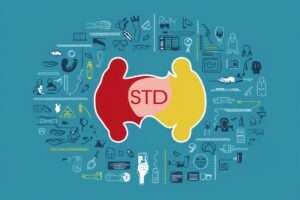Can You Get an STD from Masturbating? Debunking Myths and Understanding Sexual Health
Masturbation is a common and healthy sexual practice, but many people wonder about its safety, particularly when it comes to sexually transmitted diseases (STDs).
In this comprehensive guide, we’ll explore the relationship between masturbation and STDs, debunk common myths, and provide you with accurate information to help you make informed decisions about your sexual health.
Condoms and STDs: Understanding Protection and Limitations

Table of Contents
ToggleUnderstanding Masturbation and STDs
Before we dive into the specifics, let’s clarify what we mean by masturbation and STDs:
Giardiasis: Understanding, Preventing and Treating the “Beaver Fever”
Masturbation: This refers to the self-stimulation of genitals for sexual pleasure. It’s a normal, healthy sexual activity practiced by people of all genders and ages.
Sexually Transmitted Diseases (STDs): Also known as sexually transmitted infections (STIs), these are infections that spread primarily through sexual contact. Common STDs include chlamydia, gonorrhea, syphilis, HIV, herpes, and human papillomavirus (HPV).
Pubic Lice (Crabs): Symptoms, Diagnosis and Treatment

Can You Get an STD from Masturbating Alone?
The short answer is no. When you’re masturbating by yourself, without any sexual contact with another person, it’s virtually impossible to contract an STD. Here’s why:
1. No exchange of bodily fluids: STDs typically spread through the exchange of bodily fluids like semen, vaginal fluids, or blood. When you’re masturbating alone, there’s no such exchange.
Is Scabies an STD? Understanding the Facts About This Contagious Skin Condition
2. No skin-to-skin contact with an infected person: Some STDs, like herpes or HPV, can spread through skin-to-skin contact. Solo masturbation doesn’t involve contact with anyone else’s skin.
3. Your own bacteria and viruses: The microorganisms on your body are already part of your personal microbiome. You can’t “infect” yourself with something you already have.
However, there are some important considerations to keep in mind:

Masturbation with Existing STDs
If you already have an STD, masturbation won’t cause you to “catch” it again. However, it’s essential to be aware of the following:
1. Spreading the infection: If you have a skin-based STD like herpes or HPV with visible sores, touching these areas and then touching other parts of your body could potentially spread the infection to those areas.
2. Delaying healing: Frequent masturbation might irritate infected areas, potentially delaying healing or exacerbating symptoms.
3. HIV and open wounds: If you have HIV and also have open cuts or sores on your genitals, there’s a theoretical risk of introducing the virus into your bloodstream. However, this risk is considered extremely low.
How Long Does It Take for Chlamydia to Show Up? Understanding the Timeline and Symptoms
Masturbation with Sex Toys
While solo masturbation is safe, introducing sex toys into your routine requires some precautions:
1. Clean your toys: Always clean your sex toys before and after use. This prevents the buildup of bacteria that could lead to infections (though not necessarily STDs).
2. Don’t share toys: Sharing sex toys without properly cleaning them between users can potentially spread STDs. If you do share toys, use a new condom on the toy for each person or clean it thoroughly between uses.
3. Choose body-safe materials: Opt for sex toys made from non-porous materials like silicone, glass, or metal, which are easier to clean and less likely to harbor bacteria.
Trichomoniasis: Understanding, Preventing and Treating this Common STI

Mutual Masturbation and STD Risk
Mutual masturbation, where you and a partner stimulate yourselves or each other, carries a low but not zero risk of STD transmission. Here’s what you need to know:
1. Skin-to-skin contact: STDs that spread through skin contact, like herpes or HPV, could potentially be transmitted during mutual masturbation if infected areas come into contact with a partner’s skin.
2. Bodily fluids: If sexual fluids from one person come into contact with the other person’s genitals or any cuts or open sores, there’s a potential for STD transmission.
3. Unwashed hands: If someone touches their own genitals and then their partner’s without washing hands in between, there’s a small risk of transmitting certain infections.
To reduce risks during mutual masturbation:
– Wash hands before and after sexual activity
– Avoid contact with any visible sores or lesions
– Consider using barrier methods like gloves or dental dams
– Don’t share sex toys without proper cleaning or protection
Debunking Common Myths
Let’s address some common misconceptions about masturbation and STDs:
Myth 1: Masturbation can give you an STD.
Fact: Solo masturbation cannot give you an STD. STDs require transmission from an infected person.
Myth 2: Excessive masturbation increases STD risk.
Fact: The frequency of masturbation doesn’t impact your risk of contracting an STD. However, excessive masturbation might cause skin irritation, which could theoretically increase susceptibility to infections if you then engage in partnered sexual activity.
Myth 3: Masturbation can cure or prevent STDs.
Fact: While masturbation has many health benefits, it cannot cure or prevent STDs. Proper medical treatment is necessary for managing and treating STDs.
Promoting Sexual Health Through Safe Masturbation
Masturbation can actually be a part of a healthy sexual lifestyle. Here’s how:
1. Safe sexual outlet: Masturbation provides a safe way to explore your sexuality and experience sexual pleasure without the risk of STDs or unwanted pregnancy.
2. Stress relief: Masturbation can help reduce stress and improve sleep, contributing to overall health.
3. Understanding your body: Regular masturbation helps you understand your body and sexual responses, which can improve partnered sexual experiences.
4. Pain relief: For some people, masturbation can help alleviate menstrual cramps or other types of pain.
When to Seek Medical Advice
While masturbation itself doesn’t cause STDs, it’s important to be aware of your sexual health. Consult a healthcare provider if you notice:
– Unusual discharge from the genitals
– Pain or burning during urination
– Sores, bumps, or rashes in the genital area
– Itching or irritation that doesn’t go away
– Pain during masturbation or sex
Remember, many STDs can be asymptomatic, so regular STD testing is crucial if you’re sexually active, even if you don’t have symptoms.
Conclusion
Masturbation, when practiced alone, is a safe sexual activity that doesn’t put you at risk for STDs. However, it’s important to maintain good hygiene, use clean sex toys, and be aware of the potential risks involved in mutual masturbation or sharing sex toys.
By understanding these facts and taking appropriate precautions, you can enjoy the benefits of masturbation while maintaining your sexual health.
Remember, knowledge is power when it comes to sexual health. Don’t hesitate to speak with a healthcare provider if you have concerns or questions about masturbation, STDs, or any aspect of your sexual well-being.
Reference to External Sources:
[1] https://www.cdc.gov/std/general/default.htm
[2] https://www.who.int/news-room/fact-sheets/detail/sexually-transmitted-infections-(stis)
[3] https://www.plannedparenthood.org/learn/sex-pleasure-and-sexual-dysfunction/masturbation/masturbation-safe


